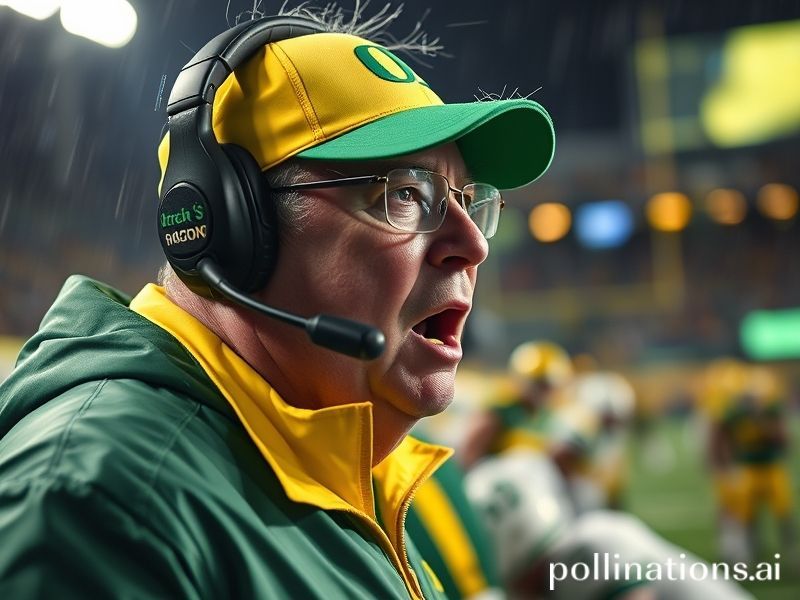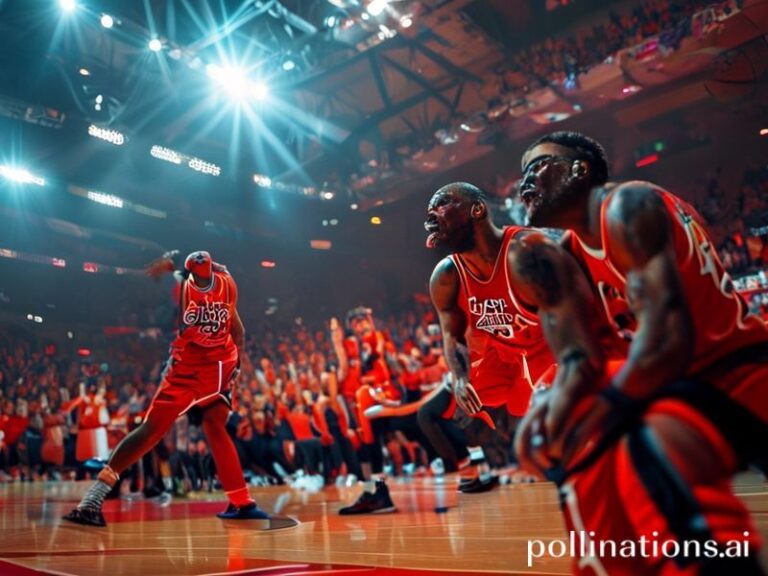Oregon Hires New Head Coach, Earth Keeps Spinning Toward Oblivion: A Global Dispatch
PORTLAND, Oregon — In a world where the price of eggs is being negotiated by hedge-fund algorithms and children learn geography from drone-strike footage, the University of Oregon has gone ahead and appointed a new head football coach. Yes, while glaciers calve like cheap wedding cakes and the South China Morning Post runs sidebars on how to survive a nuclear winter, Eugene has decided that the most urgent order of business is to find the right guy to scream “Hurry up!” at nineteen-year-olds in fluorescent socks.
Enter Dan Lanning, age thirty-six, a man whose Wikipedia photo looks like he’s just been told the campus Wi-Fi is down for the weekend. To the untrained eye, Lanning is merely the latest interchangeable alpha in a long line of visor-wearing generals tasked with ferrying the Ducks to the promised land of a four-loss season and a citrus-themed consolation bowl. But zoom out—preferably via one of the Pentagon’s surplus surveillance satellites—and the hire becomes a darkly comic parable about late-stage civilization’s priorities.
Consider the optics from the cheap seats in, say, Lagos or Lahore. America’s Pacific Northwest, famed for rain-drenched earnestness and artisanal melancholy, is currently on fire half the year. Its cities ration water like wartime Vienna. Yet the regional passion play remains a Saturday ritual in which two groups of padded Americans attempt to advance a leather ellipsoid across hypothetical lines, cheered on by alumni whose student-loan statements arrive quarterly like ransom notes. Somewhere in the Sahel, a goatherd listening to BBC World Service scratches his head and wonders if the term “civilizational decline” might be redundant.
Globally, the appointment lands with all the diplomatic weight of a TikTok dance. Still, there are ripple effects. Nike—headquartered a Frisbee toss from Autzen Stadium—will ship another crate of iridescent uniforms stitched together by the steady hands of Southeast Asian teenagers, thereby ensuring that the GDP of a small Vietnamese province ticks up a fraction of a percent. Meanwhile, European betting syndicates adjust their algorithms to account for Coach Lanning’s exotic preference for running on first down, a decision that will ultimately determine whether a plumber in Bratislava eats ramen or ribeye next week.
Back in the States, the hire is presented as a triumph of meritocracy, a word Americans like the way the French like foie gras—without dwelling too long on how it’s produced. Lanning arrives fresh from Georgia, where he helped orchestrate a defense so stifling it could double as a metaphor for U.S. immigration policy. The talking heads praise his “energy” and “recruiting chops,” phrases that translate loosely to “he owns a cellphone and can text seventeen-year-olds without violating state law.” Somewhere in the commentariat, a think-tank fellow is already drafting a white paper linking SEC defensive schemes to hedge-fund risk models, because nothing says intellectual rigor like forcing analogies between linebackers and derivatives.
And what of the players? They are, as always, unpaid interns in a multibillion-dollar industry that calls itself amateur the way casinos call themselves entertainment venues. Many will major in “general studies,” a curriculum designed for maximum eligibility and minimal existential dread. A few will go on to the NFL, where they can graduate to chronic traumatic encephalopathy and early-onset dementia. The rest will exit with a diploma and a lingering sense that the best four years of their lives peaked in a stadium named after a credit-union.
In the end, the Oregon head-coach saga is less about X’s and O’s than about humanity’s remarkable talent for distraction. While the planet’s thermostat ticks toward “medium-rare,” we appoint field generals, retweet highlight reels, and argue over the transfer portal like medieval peasants arguing over indulgences. Someday archaeologists will sift through the detritus of our era—microplastics, vape cartridges, and commemorative bobbleheads—and conclude that we were a species terminally addicted to spectacle. They won’t be wrong.
But hey, spring practice starts in eighty-three days, and the new man has promised a “culture of relentless competition.” In a relentlessly competing world, that almost passes for hope.







